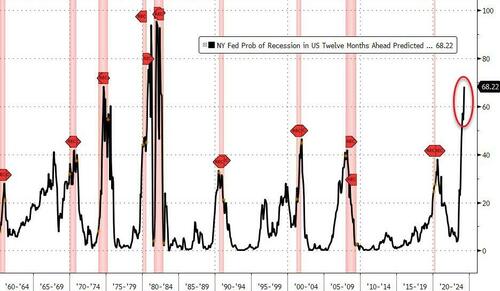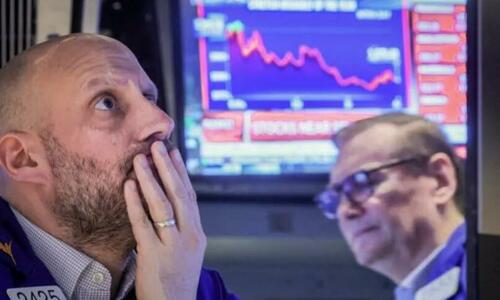Authored by Tom Ozimek via The Epoch Times,
The odds that the United States will fall into a recession at some point over the next 12 months have risen to a 40-year high, according to a probability model from the New York Federal Reserve.
The probability that the country will enter a recession within the next year has risen to 68.2 percent, according to the New York Fed, which is the highest level since 1982.
The Fed’s recession risk indicator is now greater than it was in November 2007, not long before the subprime crisis, when it stood at 40 percent.
The recession model is based on the spread between the three-month and 10-year yields on U.S. Treasurys.
For months, the U.S. economy had been projected to show slowing real GDP growth and labor market softening.
Amid the banking sector turmoil sparked by the collapse of Silicon Valley Bank, economists at the Federal Reserve have projected a shallow recession.
“Given their assessment of the potential economic effects of the recent banking-sector developments, the staff’s projection at the time of the March meeting included a mild recession starting later this year, with a recovery over the subsequent two years,” stated the minutes from a March meeting of the Federal Open Market Committee (FOMC).
There has been a growing chorus of experts who believe that the odds of a recession are high.
Former Treasury Secretary Larry Summers said he thinks the chances are “probably about 70 percent.”
“The chance that a recession will have begun this year in the U.S. over the next 12 months is probably about 70 percent,” Summers said in a recent interview with Foreign Policy.
“As I put together the lags associated with monetary policy, the credit crunch risks, the need for continuing action around inflation, the risk of geopolitical or other shocks affecting commodities, 70 percent would be the range that I would be in.”
Economists at Capital Economics published their latest quarterly U.S. economic outlook report, warning that the “acute bank stress” will result in “further tightening” of credit conditions, leaving them “even more convinced that the economy will fall into recession this year.”
ING economists are also “more convinced than ever” with their prediction of a recession, citing in a research note the financial turmoil and the Fed’s monetary policy tightening.
A recent poll showed that most Americans believe that the country is headed for a recession—or has already fallen into an economic downturn.
Pessimism about the economy hit a record high amid rampant price inflation, rising interest rates, and growing recession concerns, according to the latest CNBC All-America Economic Survey.
The survey showed that 69 percent of U.S. adults have negative views about the current economic landscape, which is the highest figure since the survey began 17 years ago.
The elevated recession risk comes amid a debt ceiling standoff in Washington.
Debt Ceiling Deadlock
The Treasury Department has warned that the United States could default as soon as June 1 if no deal is reached.
The White House has put out an analysis that said even a “short” default could eliminate half a million jobs and that a “protracted” one could cost 8.3 million jobs.
When the United States reached the $31.4 trillion debt cap in January, the Treasury Department started resorting to “extraordinary measures” to keep making payments on outstanding federal debt obligations and keep the government from defaulting.
At some point, however, the scope to continue with those accounting maneuvers will run out and the government will face the prospect of being unable to meet its financial obligations—a moment known as the X-date.
When the X-date is reached and there’s no agreement in Congress to lift the cap, the Treasury Department will be unable to issue any more bills, bonds, or notes and can only make payments on the government’s debt obligations from incoming tax revenues.
After a three-month hiatus, negotiations on raising the debt cap resumed on May 9 between President Joe Biden and House Speaker Kevin McCarthy (R-Calif.), but they ended with no breakthrough.
Biden has insisted on a clean bill to raise the borrowing limit, while McCarthy and House Republicans have put forward a proposal that would pair lifting the cap by $1.5 trillion with $4.5 trillion in spending cuts over a decade. The president has rejected the GOP proposal and vowed to veto it if it reaches his desk.




